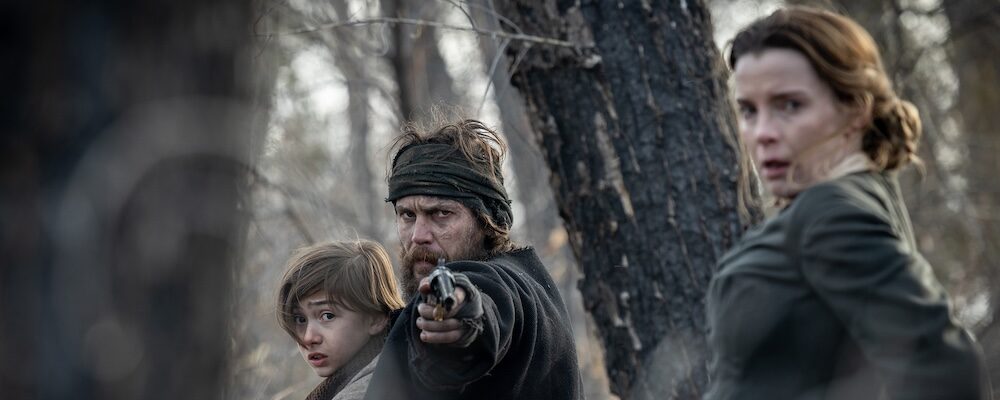‘American Primeval’ Is an Ultraviolent, Hellishly Visceral Saga Through the Old West
Alci Rengifo
The Western keeps finding ways to refresh itself. Netflix’s “American Primeval,” even in its title, wants to announce itself as a rougher, meaner, edgier Western that carries a kind of primitive attitude. Its founding premise is not wrong in presenting the idea that in its infancy, the United States was a cocktail of Native Americans, settlers, religious fanatics and outlaws, among countless other identities. Yet, this is distilled through the voices of co-creators Peter Berg and Mark L. Smith, the former a director who thrives in dirty testosterone and the latter a writer of rip-roaring popcorn entertainments. The result is a series that can meander while ripping apart starry-eyed notions of our history.
Aside from the grit, the other draw is Taylor Kitsch, who is a natural in this kind of production. The initial focus of the narrative is Sara Rowell (Betty Gilpin), who arrives in the Utah Territory circa 1857 with her young son, Devin (Preston Mota). As the title makes ever so clear, this is a primeval land where the U.S. Army, Native Americans, pioneers and the Mormon Militia are all struggling to carve out land and dominance. When Sara misses the convoy at Fort Bridger meant to take her to her husband, she and Devin join a small group of Mormons led by married couple Jacob Pratt (Dane DeHaan) and Abish (Saura Lightfoot Leon). What follows is a brutal massacre involving Mormon militiamen and Shoshone warriors. Now on the run, Sara and Devin are helped by a scruffy mountain man, Isaac (Kitsch) and mute Shoshone girl Two Moons (Shawnee Pourier). Bounty hunters are also seeking Sara as the U.S. Army faces off with Brigham Young (Kim Coates), the iron-fisted Mormon leader.
This kind of plotting makes “American Primeval” sound like a sprawling saga on the order of Kevin Costner’s recent “Horizon: An American Saga.” Other reviewers have also brought up the smash hit series “Yellowstone,” which has revived the Western on television and surely paved the way for this one to get approved. Yet, Berg and Smith’s show lacks the color and sweep of those two melodramas. Every frame of “American Primeval” looks like the color was drained out in the editing room, because these days you’re considered gritty if the frame looks depressive. To be fair, there are memorable, visceral moments. A highlight is how the show recreates the infamous Mountain Meadows Massacre, captured with a stunning sense of what blood-curdling violence must have really felt like in the pioneer days. Like his action movies based on real events such as “Lone Survivor” and “Deepwater Horizon,” Berg makes sure we get plenty of close-ups of infected wounds. The excellent costume design almost reeks off the screen. This is a west of uncleanliness and brutal elements. During the initial massacre, Jacob and Abish are scalped but survive only to be separated. Theirs becomes a wrenching journey to find each other. This is not a Western that quickly resorts to sweeping romance.
For most of its six episodes, “American Primeval” stops feeling like a lean narrative however, and more like one idea that keeps getting hammered in, mainly that life in the Old West was not pleasant or picturesque. It is essentially a chase show that cuts back and forth between the various parties, always coming back to Sara. There are very good performances all over that rise above the writing’s limitations. Betty Gilpin has the urgency demanded of her role and Kitsch nearly disappears behind his beard and costume, showing off a subdued wildness in his stare as they trek through the wilderness, facing human and natural threats. Mosty everyone gets overshadowed by Kim Coates as Brigham Young, head of the Church of Jesus Christ of Latter-Day Saints who is a cynical, cold operator willing to make moral compromises to get assure his people found “Zion” in Utah. One of the more fascinating aspects of the storyline is how it explores that formation of Mormon militias as a response to the violent prejudice the religion faced in various states. Having been expelled through murder and violence, the Mormons are portrayed as a fierce, armed collective. The idea that Utah is the one state where they can settle peacefully turns out to be an illusion.
Further, more serious exploration of such themes would have enriched this series but Berg is after direct suspense. There are some sociological messages thrown in about bonding through crises, as when Abish connects with her Shoshone captors, in particular Red Feather (Derek Hinkey) and his mother, Winter Bird (Irene Bedard). Abish soon becomes the character who embodies the idea that people should rise above the hatreds fueled by religion and racism. Jacob is the one who goes more on a “Last of the Mohicans”-style journey to find his wife. It is all full of blood-soaked intensity, and at times can get redundant. As with so many TV series, the plot of “American Primeval” can feel like it would have worked just as well as a tight film. For diehard Western fans, they will still get their desired dose of ferocity and larger than life personalities. Most of all, even when it meanders, this series can be commended by challenging our romanticized notions of American history. Our titanic nation was founded not so much by heroes as by blood and iron.
“American Primeval” begins streaming Jan. 9 on Netflix.

